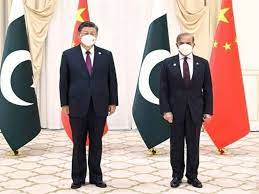Pakistan-China CCI urged to take effective measures to cope with climatic challenges

Lahore: The Pakistan-China Joint Chamber of Commerce and Industry (PCJCCI) has urged to take effective measures to cope with the climatic challenges.
Sharing his views on climate change in a meeting held here at PCJCCI Secretariat, the join chamber’s President Moazzam Ghurki said that despite contributing less than one percent of global emissions, Pakistan was among the top 10 countries most affected by the climatic impacts in the past two decades.
He added that Pakistan’s agriculture-based economy was sensitive to climate-related shocks, and disasters could exacerbate the water security challenges.
The PCJCCI President maintained that according to the official post-disaster needs assessment (PDMA) 2022, the damages and losses were USD 14.9 billion and USD 15.3 billion respectively, with roughly 33 million people affected, of which 8 million were displaced.
“Preliminary estimates suggested that as a direct consequence of these floods, the national poverty rate could jump to 4.0 percent, pushing up to 9 million people into poverty last year. This time our country is at risk of Extremely Severe Cyclonic Storm (ESCS), “Biparjoy” which can badly affect major areas of Sindh and Balochistan,” he mentioned.
On this occasion, Fang Yulong, Senior Vice President PCJCCI said that Pakistan was one of the most water-stressed countries in the world.
“Only 36 percent of Pakistanis have access to safely managed drinking water, down from 38 percent in 2004. Fundamentally, Pakistan’s vulnerability to climate change was deeply linked with its socio-economic challenges and governance,” he contended.
Fang Yulong mentined that the domestic institutions at all levels still follow a response-centric approach to disaster management, and disaster risk management (DRM) was not integrated with the planning and development process, namely, development initiatives often end up increasing risk rather than decreasing it was causing maladaptation. “There is a dire need to implement and establish a proper system and plan to fight with such catastrophic situations,” he suggested.
Hamza Khalid, Vice President PCJCCI stressed that many of the critical infrastructures, including hospitals, major roads and power, were badly affected during the 2022 floods because it was located in high-risk areas without appropriate safeguard measures.
“Moreover, this situation was exacerbated by limited hydro-meteorological measurement and research. He also added that making cities more sustainable through the adoption of nature-based solutions and green infrastructure in an urban setting was something that we should learn from China,” he contended.





